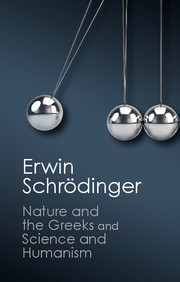Book contents
- Frontmatter
- Contents
- Foreword
- NATURE AND THE GREEKS
- SCIENCE AND HUMANISM
- Dedication
- Preface
- The spiritual bearing of science on life
- The practical achievements of science tending to obliterate its true import
- A radical change in our ideas of matter
- Form, not substance, the fundamental concept
- The nature of our ‘models’
- Continuous description and causality
- The intricacy of the continuum
- The makeshift of wave mechanics
- The alleged break-down of the barrier between subject and object
- Atoms or quanta-the counter-spell of old standing, to escape the intricacy of the continuum
- Would physical indeterminacy give free will a chance?
- The barto prediction, according to Niels Bohr
The barto prediction, according to Niels Bohr
Published online by Cambridge University Press: 05 October 2014
- Frontmatter
- Contents
- Foreword
- NATURE AND THE GREEKS
- SCIENCE AND HUMANISM
- Dedication
- Preface
- The spiritual bearing of science on life
- The practical achievements of science tending to obliterate its true import
- A radical change in our ideas of matter
- Form, not substance, the fundamental concept
- The nature of our ‘models’
- Continuous description and causality
- The intricacy of the continuum
- The makeshift of wave mechanics
- The alleged break-down of the barrier between subject and object
- Atoms or quanta-the counter-spell of old standing, to escape the intricacy of the continuum
- Would physical indeterminacy give free will a chance?
- The barto prediction, according to Niels Bohr
Summary
But let us return to our subject proper. A much more serious and interesting attempt to explain the difficulty away was founded by Bohr and Heisenberg on the idea, mentioned above, that there is an unavoidable and uncontrollable mutual interaction between the observer and the observed physical object. Their ratiocination is briefly as follows. The alleged paradox consists in this, that according to the mechanistic view, by procuring an exact knowledge of the configuration and velocities of all the elementary particles in a man's body, including his brain, one could predict his voluntary actions—which thereby cease to be. what he believes them to be, namely voluntary. The fact that we cannot actually procure this detailed knowledge is no great help. Even the theoretical predictability shocks us.
To this Bohr answers that the knowledge cannot even be procured in principle, not even in theory, because such accurate observation would involve so strong an interference with ‘the object’ (the man's body) as to dissociate it into single particles—in fact kill him so efficiently that not even a corpse would be left for burial. At any rate, no prediction of behaviour would result, before the ‘object’ is far beyond the state of exhibiting any voluntary behaviour.
- Type
- Chapter
- Information
- 'Nature and the Greeks' and 'Science and Humanism' , pp. 168 - 171Publisher: Cambridge University PressPrint publication year: 2014

